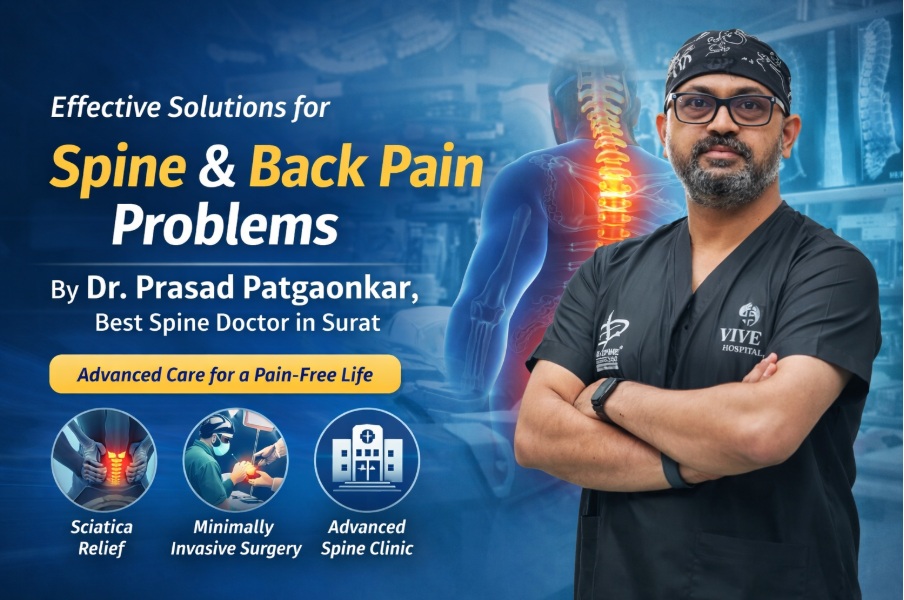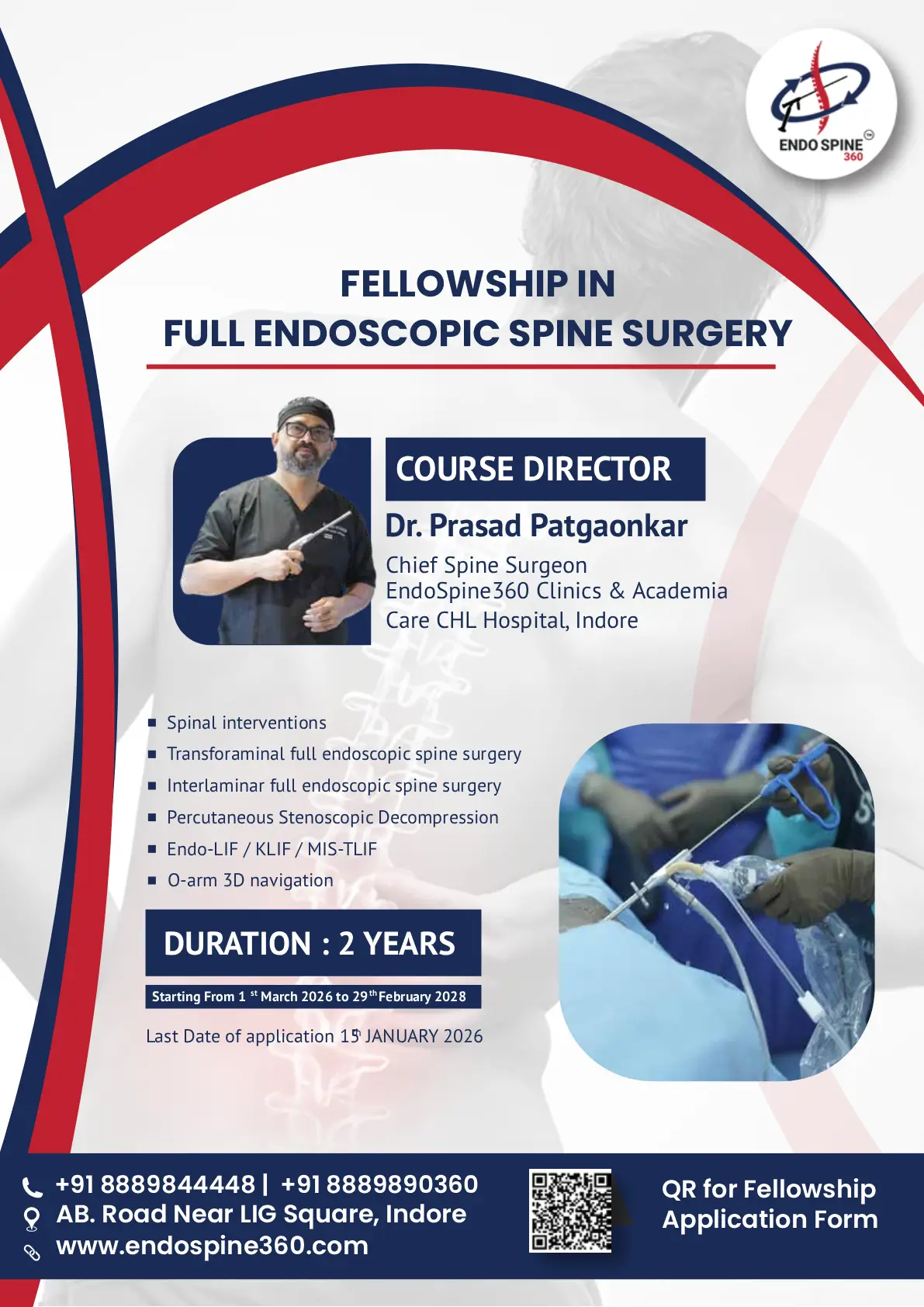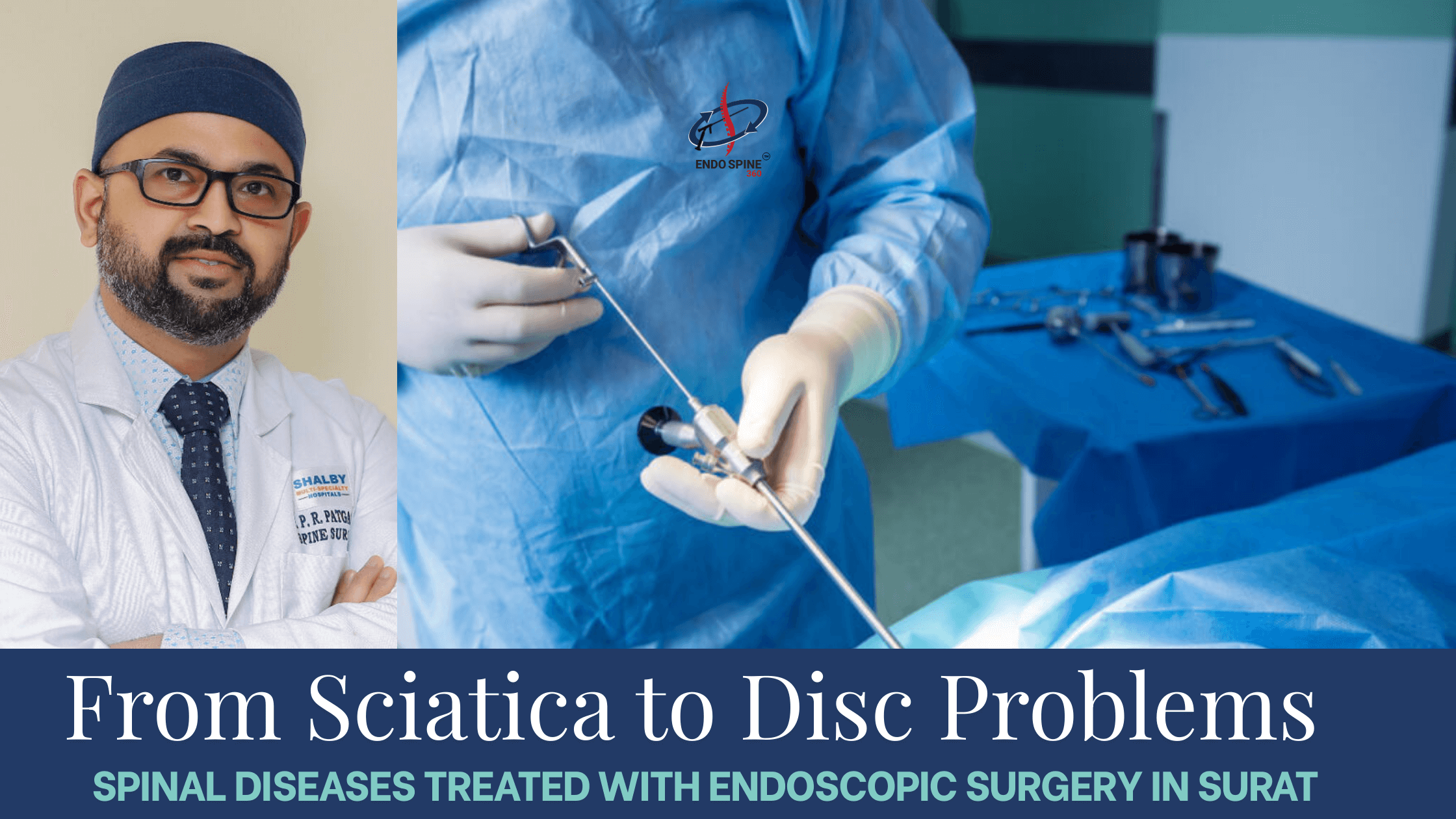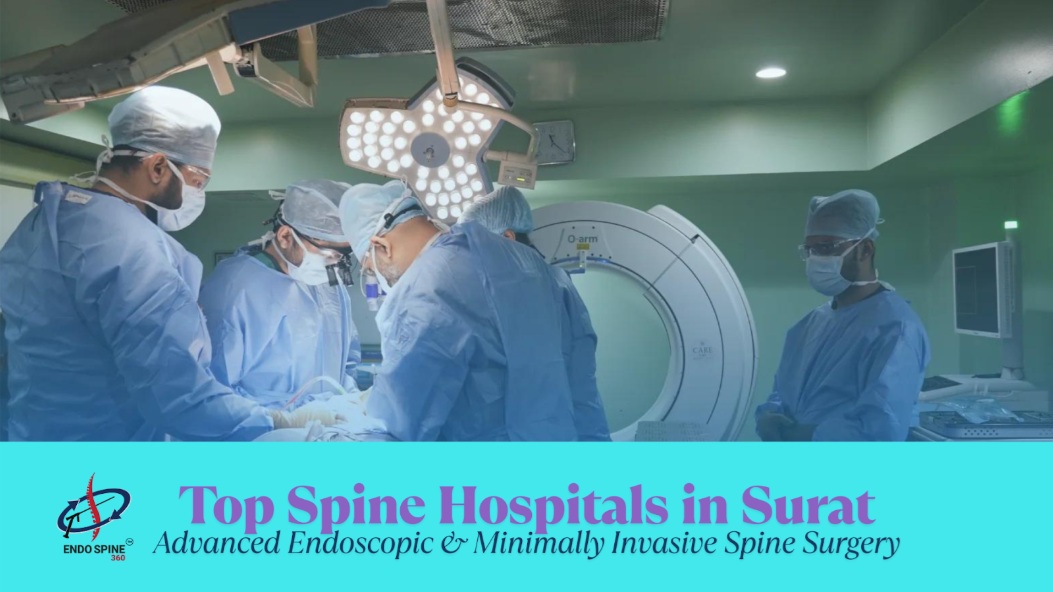Top Endoscopic Spine Surgeons in Surat: A Guide to the Benefits of Modern Spine Surgery
- Admin
When it comes to spine health, advancements in medical technology have revolutionized the way spinal conditions are treated. In Surat, top endoscopic spine surgeons like Dr. Prasad Patgaonkar are leading the charge in providing patients with modern, minimally invasive solutions for their back and neck pain. This blog will explore the benefits of endoscopic spine surgery and why consulting with a top spine specialist in Surat can be a life-changing decision.
Understanding Endoscopic Spine Surgery
Endoscopic spine surgery is a minimally invasive technique that allows surgeons to treat spinal conditions with greater precision, smaller incisions, and less disruption to surrounding tissues. Unlike traditional open spine surgery, which often involves large incisions and significant recovery time, endoscopic procedures are performed through tiny incisions using a specialized camera and instruments.
Benefits of Endoscopic Spine Surgery
- Minimally Invasive Approach:
One of the most significant advantages of endoscopic spine surgery is its minimally invasive nature. The small incisions used in this procedure mean that there is less damage to muscles and tissues, resulting in reduced pain and a quicker recovery.
- Reduced Recovery Time:
Patients who undergo endoscopic spine surgery often experience a much faster recovery compared to those who have traditional open surgery. Many patients can return to their normal activities within a few weeks, allowing them to get back to their lives sooner.
- Less Postoperative Pain:
With less tissue disruption and smaller incisions, patients typically experience less postoperative pain. This reduces the need for strong pain medications and allows for a more comfortable recovery process.
- Lower Risk of Complications:
Endoscopic spine surgery reduces the risk of complications such as infections and blood loss. The precision of the procedure also minimizes the chances of nerve damage and other surgical risks.
- Smaller Scars:
The tiny incisions used in endoscopic surgery result in minimal scarring, which is an added cosmetic benefit for patients concerned about visible surgical marks.
- High Success Rates:
Endoscopic spine surgery has high success rates for treating various spinal conditions, including herniated discs, spinal stenosis, and degenerative disc disease. The effectiveness of the procedure is well-documented, and many patients report significant improvements in their symptoms.
Why Choose a Top Spine Consultant in Surat?
Surat is home to some of the best spine specialists in the country. These top spine consultants in Surat are highly trained in the latest surgical techniques and have extensive experience in performing endoscopic spine surgeries. By choosing a top endoscopic spine surgeon in Surat, patients can benefit from:
Expert Diagnosis: Top spine consultants in Surat are skilled in accurately diagnosing spinal conditions and determining the most appropriate treatment plan for each patient.
Personalized Care: These specialists take the time to understand each patient’s unique condition and tailor their approach to ensure the best possible outcomes.
Advanced Technology: Top endoscopic spine surgeons in Surat utilize state-of-the-art technology and equipment, ensuring that patients receive the most advanced and effective care available.
Compassionate Support: The best spine consultants in Surat prioritize patient well-being, providing compassionate support throughout the treatment process, from diagnosis to recovery.
Success Stories from Surat
Patients who have undergone endoscopic spine surgery in Surat often share stories of dramatic improvements in their quality of life. Whether it's being able to return to work, resume physical activities, or simply live without chronic pain, the impact of this modern surgical approach is profound.
For example, Mrs. Shalini, a 40-year-old homemaker, had been struggling with severe lower back pain due to a herniated disc. After consulting with a top endoscopic spine surgeon in Surat, she underwent a minimally invasive procedure that not only relieved her pain but also allowed her to regain her mobility within weeks. Her success story is just one of many that highlight the transformative power of modern spine surgery.
Conclusion: Your Path to Pain-Free Living
If you’re suffering from a spinal condition and are considering surgery, endoscopic spine surgery offers a promising solution with numerous benefits. By consulting with a top spine consultant in Surat, you can explore the most advanced treatment options and embark on a path to pain-free living.
Don’t let back or neck pain hold you back from enjoying life. Reach out to a top endoscopic spine surgeon in Surat today and take the first step towards a healthier, more active future.
Next Steps After Endoscopic Spine Surgery
After undergoing endoscopic spine surgery, proper post-operative care is essential to ensure a smooth recovery and achieve the best possible outcomes. Here’s a guide on what to expect and the next steps to take following your surgery:
- Immediate Post-Operative Care
Monitoring: After the surgery, you'll be moved to a recovery room where medical staff will monitor your vital signs, pain levels, and the initial effects of the surgery.
Pain Management: You may experience some discomfort or pain around the incision site. Your doctor will prescribe pain medications to help manage this, ensuring you're comfortable during the early stages of recovery.
Mobility: Depending on the surgery's complexity, you may be encouraged to start moving or walking with assistance shortly after the procedure. Early movement can help prevent complications like blood clots and speed up recovery.
- Hospital Stay and Discharge
Duration: Many patients who undergo endoscopic spine surgery can go home the same day or within 24 hours, as the minimally invasive nature of the procedure often allows for a shorter hospital stay.
Discharge Instructions: Before leaving the hospital, you’ll receive detailed instructions on how to care for your incision site, manage pain, and any restrictions on activities. Be sure to follow these instructions carefully to avoid complications.
- At-Home Recovery
Wound Care: Keep the surgical site clean and dry to prevent infection. Your doctor will provide specific instructions on how to care for the incision, including when you can shower and how to change dressings if needed.
Activity Restrictions: While endoscopic spine surgery allows for a quicker return to normal activities, it’s important to avoid strenuous activities, heavy lifting, and twisting motions until your doctor gives you the green light. Gradually increase your activity level as your body heals.
Pain Management: Continue to take any prescribed medications as directed, and consider over-the-counter pain relievers if recommended by your doctor. Be mindful of your pain levels and avoid pushing yourself too hard.
- Physical Therapy
Rehabilitation: Physical therapy may be recommended as part of your recovery plan. A physical therapist will guide you through exercises designed to strengthen your back, improve flexibility, and restore your range of motion.
Exercise Plan: Your therapist will provide you with a personalized exercise plan to continue at home. Consistent exercise can help prevent future spine issues and support long-term recovery.
- Follow-Up Appointments
Scheduled Visits: Regular follow-up appointments with your spine surgeon are crucial to monitor your healing progress. During these visits, your doctor will assess the incision site, check for any signs of complications, and adjust your treatment plan as needed.
Progress Assessment: These visits are also an opportunity to discuss your recovery progress, any concerns you may have, and the timeline for returning to normal activities, including work and exercise.
- Lifestyle Adjustments
Posture and Ergonomics: Maintaining good posture and using ergonomic furniture can help protect your spine as you recover. Your physical therapist can provide tips on how to sit, stand, and move in ways that minimize strain on your back.
Healthy Habits: Incorporate healthy lifestyle habits, such as regular low-impact exercise, maintaining a healthy weight, and avoiding smoking, to support your spine health and overall well-being.
- Signs to Watch For
Red Flags: Be aware of any signs of complications, such as increasing pain, swelling, redness around the incision site, fever, or any unusual symptoms. Contact your doctor immediately if you experience any of these issues.
- Returning to Normal Activities
Gradual Return: As you progress in your recovery, your doctor will advise you on when it’s safe to return to work, drive, and engage in physical activities. This timeline varies based on the individual and the complexity of the surgery.
Conclusion: A Path to Full Recovery
Endoscopic spine surgery offers a quicker and less painful recovery compared to traditional spine surgery, but following your post-operative care plan is key to achieving the best results. By adhering to your doctor’s instructions, participating in physical therapy, and making necessary lifestyle adjustments, you can look forward to a successful recovery and a return to your normal activities with reduced pain and improved quality of life.
Remember, every patient’s recovery journey is unique. Stay in close communication with your healthcare team, and don’t hesitate to ask questions or express any concerns during your recovery process.
Frequently Asked Questions (FAQ) About Endoscopic Spine Surgery Recovery
A: Recovery time varies depending on the individual and the specific procedure, but many patients can return to light activities within a few weeks. Full recovery and a return to more strenuous activities may take several weeks to a few months.
A: Some discomfort or mild pain is normal after endoscopic spine surgery, but it is typically less severe than with traditional open surgery. Your doctor will prescribe pain medication to help manage any discomfort during the early stages of recovery.
A: The timing for returning to work depends on the nature of your job and the extent of your surgery. Many patients with desk jobs can return to work within a few weeks, while those with physically demanding jobs may need more time.
A: Avoid heavy lifting, bending, twisting, and high-impact activities during the early recovery period. Your doctor will provide specific guidelines based on your surgery and overall health.
A: Yes, physical therapy is often recommended to help strengthen your back, improve flexibility, and ensure a full recovery. Your doctor will guide you on when to start physical therapy and what exercises are appropriate.
Search
Categories
Popular Tags
Recent Post
-
Effective solutions for spine and back pain problems by the best spine doctor in surat

Back pain and spine-related disorders have become increasingly common ...
Read more -
Full endoscopic fellowship 2026

Fellowship in full endoscopic spine surgery under Dr. Prasad Patgaonka...
Read more -
From sciatica to disc problems: spinal diseases treated with endoscopic surgery in surat

Spine pain can quietly affect every part of your life—from walking and...
Read more -
Top spine hospitals in surat offering endoscopic & minimally invasive surgery

Back and spine problems can affect your daily activities, mobility, an...
Read more



